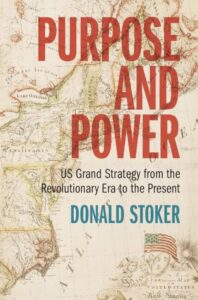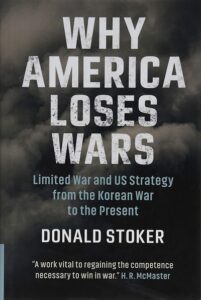World Geostrategic Insights interview with Donald J. Stoker on the alleged U.S. quest for global hegemony, American goals and strategy toward China and the ongoing conflict in Ukraine, and whether the 2024 presidential election and campaign will influence U.S. strategic goals.

Dr. Donald Stoker is Professor of National Security and Resource Strategy at the Dwight D. Eisenhower School of the National Defense University, in Washington, DC. He was Professor of Strategy and Policy for the U.S. Naval War College’s Monterey Program at the Naval Postgraduate School in Monterey, California, from 1999 until 2017. He was a Fellow of the Changing Character of War Programme at the University of Oxford’s Pembroke College in 2016, and the Fulbright Distinguished Professor of Political Science at the Diplomatic Academy in Vienna, Austria, 2017-2018. He has lectured for defense organizations in the United States, Poland, Great Britain, Canada, Austria, Australia, and India.
 In your newly released book “Purpose and Power: U.S. Grand Strategy from the Revolutionary Era to the Present,” you make a masterful analysis of the grand strategy of American foreign policy throughout history. From the struggle for independence to the era of renewed competition with China and Russia, you reveal the grand strategies behind the U.S. pursuit of sovereignty, security, expansion, and democracy abroad and demonstrate how successive U.S. administrations have projected diplomatic, military, and economic power, and mobilized ideas and information to preserve American freedoms at home and secure U.S. goals abroad. You even dwell on the myth of American isolationism and the positive and negative aspects of American promotion of democracy abroad. And you also point out how too often U.S. administrations have not had clear policy objectives or a concrete vision of the direction to take, falling into “strategic ambiguity.” The collapse of the Soviet Union in 1989 propelled the United States into a position of unchallenged global hegemony. Was world unilateral hegemony a strategic goal of the United States, instrumental to other U.S. foreign policy objectives?
In your newly released book “Purpose and Power: U.S. Grand Strategy from the Revolutionary Era to the Present,” you make a masterful analysis of the grand strategy of American foreign policy throughout history. From the struggle for independence to the era of renewed competition with China and Russia, you reveal the grand strategies behind the U.S. pursuit of sovereignty, security, expansion, and democracy abroad and demonstrate how successive U.S. administrations have projected diplomatic, military, and economic power, and mobilized ideas and information to preserve American freedoms at home and secure U.S. goals abroad. You even dwell on the myth of American isolationism and the positive and negative aspects of American promotion of democracy abroad. And you also point out how too often U.S. administrations have not had clear policy objectives or a concrete vision of the direction to take, falling into “strategic ambiguity.” The collapse of the Soviet Union in 1989 propelled the United States into a position of unchallenged global hegemony. Was world unilateral hegemony a strategic goal of the United States, instrumental to other U.S. foreign policy objectives?
The question is built upon mistaken premises. First, the US has never possessed “unchallenged global hegemony.” The collapse of the Soviet Union certainly helped place the US at the height of its power relative to other nations, but the US was not “unchallenged.” For example, the 1990-1991 Gulf War against Iraq occurred while the Soviet Union was coming apart. And the US has certainly remained “challenged” by North Korea, Iran, Al Qaeda, and others.
Second, the US has never sought global hegemony, whatever this might mean. This is an accusation commonly voiced by critics of US foreign relations and US involvement abroad (these critics are often American). It is also something regularly voiced in commentary on US foreign relations. But there is no evidence to support the contention.
Consequently, can it be said that since the end of the Cold War, a vital goal of U.S. grand strategy has been to consolidate and extend American hegemony in the international system?
Again, the United States has never sought global hegemony, so there was nothing to extend. It is a factual error to think this was ever the case. Examining the actions of the US in the first post-Cold War decade provides dramatic proof of this. At the height of its post-Second World War relative power in comparison to other nations, the US retrenched militarily, dramatically reducing its military power and military deployments overseas, particularly after the end of the 1990-1991 Gulf War. If the US had been seeking to extend its so-called hegemony, it would not have retrenched.
Also, examining US actions abroad in the 1990s in Somalia, Haiti, and the Balkans, demonstrates an American reluctance to exercise power abroad and a preference for others to bear the burdens of this, particularly in regard to the Europeans bearing responsibility in the Balkans. Additionally, the failure of the US to exert its will over Somalia and Haiti, and its stumbling in the Balkans, are proof of a lack of US hegemony, and an aversion to seeking it. If the US was a hegemon, would it not have forced Somali warlords into line? The stumbling US performance in Iraq and its defeat in Afghanistan also rebutted the US as a “global hegemon” argument.
Now, the emergence of China as a great power is directly challenging America’s global hegemony, with Chinese leaders clearly stating that China will replace the United States as the world’s leading power in the near future. Therefore, an American grand strategy aimed at containing China seems to be understandable. However, does the United States have a clear strategic vision on how to stop China’s emergence?
The question has some problems. It makes the common mistake of confusing the strategy – the use of power – with the political aim – what the use of power is supposed to achieve. Containment is a strategy; it is not an aim. One implements a strategy of containment to achieve particular political aims. For George Kennan, containment was a strategy for achieving the political aims of a “mellowing” of the Soviet Union, meaning it would become a “normal” international power and abandon its imperialist aggression, or, the Soviet Union breaking apart. Containment helped deliver the latter, though it took quite a while and evolved constantly.
Regarding stopping China’s emergence: China has already emerged. It is in many ways a peer competitor of the United States and will soon be in many arenas. (This raises an ancillary question: if the US was really a hegemon seeking to expand its power, would it have helped fund the rise of peer competitors?)
Regarding American political aims and strategy toward China: this is a harder question. I have not seen articulated by the Biden administration clear aims toward China. This does not mean these aims don’t exist on a classified document somewhere. I could also have missed such an announcement. But what Secretary of State Anthony Blinken made clear very early in the administration is that the Biden administration seeks to protect “the rules based international order,” meaning the system under which nations relate to and do business with one another. Essentially, the administration wants to preserve the international status quo. The administration’s documents, such as the National Security Strategy, point toward a strategy intended to achieve this aim.
The administration’s National Security Strategy, National Military Strategy, and other documents outline its grand strategy, which the administration calls “integrated deterrence.” This is essentially a revival of deterrence with a focus on a whole of government approach and the inclusion of allies and partners. Your readers will have to decide for themselves how effective this has been and could be in the future.
 In your book, released in August 2019, “Why America Loses Wars: Limited War and U.S. Strategy from the Korean War to the Present,” you focus on what has gone wrong with U.S. foreign policy and what needs to change to improve the outcomes of U.S. engagements in the future. You argue that the common logic that drives U.S. policymakers to engage in “limited wars” such as those in Korea, Vietnam, and Iraq is flawed and leads to failure, largely because of the absence of vision and lack of clarity in policy goals and objectives, on the definitions of winning, means, and what victory should look like. Regarding the current conflict in Ukraine, do you think the U.S. has clearly defined his strategy and goals and is resolute in achieving them? Or is there a risk that the conflict in Ukraine may become another “limited war” for the U.S.(even if without the direct involvement of U.S. troops), with the possibility of failure?
In your book, released in August 2019, “Why America Loses Wars: Limited War and U.S. Strategy from the Korean War to the Present,” you focus on what has gone wrong with U.S. foreign policy and what needs to change to improve the outcomes of U.S. engagements in the future. You argue that the common logic that drives U.S. policymakers to engage in “limited wars” such as those in Korea, Vietnam, and Iraq is flawed and leads to failure, largely because of the absence of vision and lack of clarity in policy goals and objectives, on the definitions of winning, means, and what victory should look like. Regarding the current conflict in Ukraine, do you think the U.S. has clearly defined his strategy and goals and is resolute in achieving them? Or is there a risk that the conflict in Ukraine may become another “limited war” for the U.S.(even if without the direct involvement of U.S. troops), with the possibility of failure?
This is a difficult question to answer. It is important to point out here that the US is not at war in Ukraine, despite what much commentary says. It is also important to point out that Ukraine is not a US proxy. Ukraine is fighting this war for its own reasons and would be doing so with or without US assistance.
Regarding US aims in the Ukraine War: I am not sure the US has clearly articulated the aim or aims it wishes to achieve here. In a discussion I had with an expert on this issue, he could not point to a clear aim, but what one can infer, and what administration figures have made clear, is the administration’s desire to see peace return to Ukraine. What has become US strategy here boils down to sanctions and diplomatic pressure against Russia, and material and diplomatic support for Ukraine.
On the evolution of US involvement: I hate to make predictions. Historians often do a poor job of predicting the future. A critic could say we don’t even predict the past very well. But I believe there is little chance of direct US military involvement. The Biden administration has no desire for this. Putin could decide otherwise, but this also seems unlikely.
U.S. foreign policy in 2024 will still have to deal with important issues, such as the wars in Ukraine and Middle East, relations with China, and global economic challenges. Do you think the upcoming U.S. presidential election and campaign will have an influence on the U.S. strategic goals and capabilities to achieve them?
Again, here one runs the risks entailed in making predictions. The result of the presidential election obviously will have an impact, but what is difficult to tell. If Biden is reelected, his administration may continue to do as it is already. But it could also take the opportunity to change course because Biden will not be eligible to run again. But change what and where is difficult to predict. Which party controls Congress will also affect this. If there is a Republican president, which probably would be Donald Trump, it is also difficult to predict what will happen. If we look at what Trump’s administration did last time, we can expect a tougher hand against Iran and against Chinese trade practices. With Ukraine, who knows?
Dr. Donald Stoker – American military historian. Professor and Prize-Winning Author. He is the author or editor of more than 70 publications, including 13 books, his The Grand Design: Strategy and the U.S. Civil War, 1861-1865 (Oxford University Press, 2010), won the Fletcher Pratt award, was a Main Selection of the History Book Club, is on the U.S. Army Chief of Staff’s reading list, and is widely used as a text in strategic studies and history courses. His Carl von Clausewitz: His Life and Work (Oxford University Press, 2014), is on the British Army professional reading list. His Why America Loses Wars: Limited War and U.S. Strategy From the Korean War to the Present (Cambridge University Press, 2019, 2022), is used as a text in numerous strategic studies courses. He is a Senior Advisor for Atlas Organization in Washington, D.C., and his most recent book – for Cambridge University Press – is Purpose and Power: U.S. Grand Strategy from the Revolutionary Era to the Present.
The opinions expressed here are his own.







